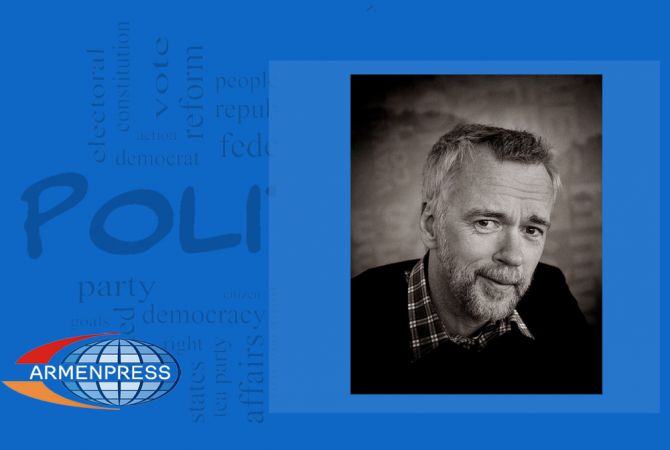Norwegian historian doesn’t see reconciliation between Armenia and Turkey without recognition of the Genocide
 11:42, 24 April 2017
11:42, 24 April 2017YEREVAN, APRIL 24, ARMENPRESS. The recognition of Armenian Genocide by the governments of different countries will enable to move forward, Norwegian historian Bård Larsen said in an interview with Armenpress. He wrote many research and scientific works on the Armenian Genocide.
Armenpress presents the full interview:
-To what extent is the Norwegian society informed about the Armenian Genocide?
-During the past ten years it has become more known in the public. But, sad to say, as for many other countries, the focus is more about the international implications regarding recognition and Turkeys responses. Most people know fairly little about what actually happened in the Ottoman Empire in 1915 and the genocidal victims. One must remember that historians, as myself, have limited impact in media. You can write op-eds and articles and so on, but most people do not read them. They read headlines in the newspapers and online, and the whole recognition spectacle pretty much grab the news. This is why it is so important that governments recognize the genocide, so that one can move forward and write about the important stuff, like what actually happened and that the story continues, with Armenians and other Christians being massacred and fleeing the Middle East today.
-More than 10 European countries have recognized the Armenian Genocide. Why Norway is not doing the same step?
-It is the same old story: Economical and geopolitical interests overshadow ethics. The Norwegian governments (and it doesn’t matter if they are social democrats or conservatives) are using the same type of ad-hoc arguments: The question of genocide is something historians deal with, not governments, and that the Norwegian government does not want to involve in a debate that could make reconciliation between Turkey and Armenia more difficult. All this is wrong, of course. Historians have dealt with it for decades and all major genocide researchers have concluded that it was indeed genocide. The idea of controversy on the matter is a result of manipulation from the Turks and some of their protagonists. And everyone understands that there can never be reconciliation as long as the perpetrator refuses to admit his crime. But this is the logic of ‘realpolitik’: Interests conquer facts and morality.
- You have defended your thesis on the topic of the Armenian Genocide. Are you currently doing new research on the topic?
-I keep myself updated on the important stuff, like Taner Ackams research on the Ottoman telegrams and so on, but I have little time to do any heavy research, due to my work in a liberal think tank, which is quite time consuming. But I write about Armenia and the genocide in op-eds and so, from time to time. It is important to keep those who are interested updated.
- During your research have you made any discovery or revealed an exclusive episode that you can share with the Armenian reader and which can have a unique impact on the international recognition of the Genocide?
-Good question. There may be a window of opportunity now, because of Erdogan’s election victory and his authoritarian politics. Turkey may very well be thrown out of the European Council because of the death penalty. If Turkey turns its back to Europe and weaken the geopolitical bonds to the democratic world, the government may change its attitude to the question of recognition. Germany’s resolution last year also adds up to this opportunity. I will certainly do my part.
-How would you assess today’s Turkey’s stance on the Armenian Genocide?
-Erdogan is of course very aggressive on the matter. As a populist and authoritarian he is of course very well aware of the benefit of external enemies. So I guess he is using the matter for what it’s worth: The West is using the Armenians as a tool to slander and break down the Turks etc. etc. His war on the Kurds is another example. One issue I have been working on lately and written about is Erdogans ideology. You all know that he is an islamist who has pretty much ended the Kemalist secular tradition. If you look into the late Young Turk ideology, which was a mix of ethnic nationalism and Islamic opportunism, that is in many ways the direction Turkey is heading today. Erdogan is also an admirer of Zia Gökalp, the sociologist and leading Young Turk intellectual, who found his ideas of a modern homogenous state among European thinkers that later inspired modern day fascism. Erdogan’s fixation on the Armenians could be also interpreted in view of this ideological nostalgia.
-During the 100th anniversary of the Armenian Genocide you were in Yerevan. What impressions did Armenia leave on you?
-Oh, I was blended. It was wonderful and emotional. It was my first visit to Armenia after years of study on the Genocide, so of course the 100th anniversary and especially my visits to Tsitsernakaberd made a huge impression. Yerevan is a beautiful city. I also had the opportunity to travel around in Armenia: Lake Sevan and the mountains above, Garni, Noravank, Khor Virap and of course Geghard.
-Do you have any plans to visit Armenia again?
-No plans as for now, but I will certainly go again. If an interesting conference pops up, I’ll be there. My wife and kids also need to see Armenia. You certainly need tourists, it helps building a country. People have no idea what they are missing.
Interview by Araks Kasyan




















